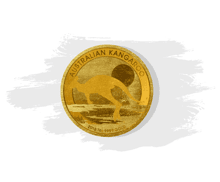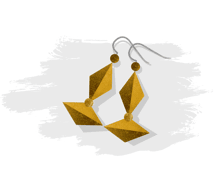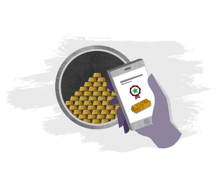
Gold bullion bars and coins
Bullion gold comes in the form of bars and coins. The value of bullion gold is determined by the value of its physical gold content. Bullion gold can be described as investment gold in its narrowest sense.

Numismatic coins and other collectibles
Collector coins or numismatic coins do not qualify as bullion coins. They are often expected to have an additional value beyond the value of their precious metals content, based on factors such as scarcity or design. Collector coins are similar to investments in art and require additional expertise from investors.

Gold investment jewellery
In many markets, such as India, China and Turkey, gold jewellery plays an important role as an investment product. Gold investment jewellery is characterised by its high purity, and therefore excludes gold-plated and similar items.
Importantly, the price of gold investment jewellery is primarily determined by its gold content so investors should be able to exchange it for a price that is similar to or higher than its material value.

Managed gold products
Managed gold products are based on vaulted gold, allocated or pool allocated, which is stored in professional vaults on behalf of customers. This caters to investors who want outright ownership of gold and exposure to its price, but do not want to take physical possession of their holdings.
Product variations include, for example, gold savings plans – which allow for the continuous accumulation of holdings – and tokenised gold, where ownership is represented by digital tokens on a blockchain.
Understanding the specific product you want to buy is essential.
There are several factors you should take into account before actually purchasing gold products. Strangely, perhaps, a key question is whether your purchase actually buys you legal title to the gold in question. You need to consider which secure storage options you feel most comfortable with and, of course, that you have adequate insurance cover. It’s also important for you to understand the different types of retail gold investment available before you make your choice, whether it’s bullion bars or coins, collectibles, investment jewellery or managed gold products.
Points covered
- Do you obtain outright ownership of physical gold?
- How do you store your gold safely?
- Does the product meet your specific needs?
PDF Download the investor guidance
Key point
Outright ownership in gold is a key feature of gold investments. It ensures that you are not exposed to any provider’s creditworthiness and that you legally own your gold.
Before buying any products, check whether your provider is bona fide.
It is advisable to check that your retail gold investment provider is both reliable and trustworthy, particularly if you’ve been approached via email or online ads. Just asking a few simple questions about a business and how it operates will help to build up a picture. Make sure you’re dealing with a provider with a physical office and support staff that you can contact via phone or email. It’s also key to know if your products qualify as regulated investment services and are covered by a compensation scheme in cases such as fraud or financial error.
Points covered
- Is the product provider trustworthy?
- Does the product provider adhere to any regulations or voluntary ‘standards’?
PDF Download the investor guidance
Key point
Check a provider or product name by searching for it on internet search engines. Adding words like ‘review’, ‘scam’ or ‘fraud’ to your search will help you to find potentially critical articles or comments.
Compare the types and costs of similar products before you buy.
Before investing in gold, you need to find out about the buying and selling fees involved. The purchase or transaction fee – sometimes referred to as commission – is typically calculated as a percentage of the amount that you’re investing. There is generally an additional premium to cover overheads and you may need to ask for the details. If you’re buying retail gold investment products offering storage, then you will be charged fees for storage, insurance, administration and other services. When selling gold, you’ll find that there are similar costs, i.e. selling fees and selling discounts. Before any transaction, check local taxation rules with a tax adviser.
Points covered
- What are the costs for buying/selling the gold?
- Are there any other costs?
PDF Download the investor guidance
Key point
The costs for buying and selling gold vary not only by provider but also by product type. This has a significant impact on costs, so be clear on your investment objective and required characteristics.
Do not allow yourself to be pressured into an investment decision.
There are both opportunities and risks in investing in gold. It is essential to have unbiased information about the potential performance of a product and you should be sceptical if you are promised guaranteed or excessive returns, or risk-free capital preservation. You can reduce the risks, for example, by requesting a certificate proving melt value and authenticity when buying bullion bars or coins or by ensuring that gold investment jewellery carries a hallmark. You should never feel pressurised into buying retail gold investments, whether through cold calling, aggressive advertising or products that are too good to be true.
Points covered
- Are the potential returns and risks stated objectively?
- Are you able to make investment decisions without undue pressure?
PDF Download the investor guidance
Key point
You should be comfortable that the type of investment product and the investment amount is suitable to your particular objectives and risk tolerance.
You should buy and sell only high-quality products that can be verified.
Having confidence in an investment provider and knowing as much as possible about how they operate will help to build long-term trust. Will they only use their own gold stock or give you access to one or more gold suppliers? How is the purchase or sale price determined? Are they adequately insured against risks such as loss, damage or robbery? If using online dealers and managed gold product providers, how good is their IT security? As environmental, social and governance (ESG) criteria become key to more stakeholders, does your provider and product match your own ESG preferences?
Points covered
- How is the gold acquired?
- Are you appropriately protected?
- Is the provider using best practices in information technology?
- Are the company’s gold sourcing and overall operations responsible?
PDF Download the investor guidance
Key point
Make sure that your provider sources gold professionally. In cases where there is deferred settlement, such as prepayment for an order, ensure that you understand the settlement terms.






